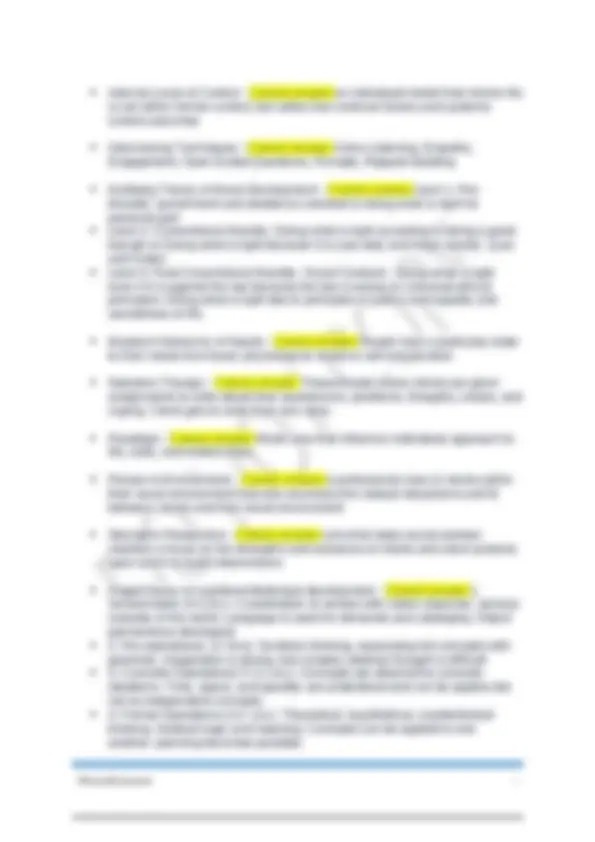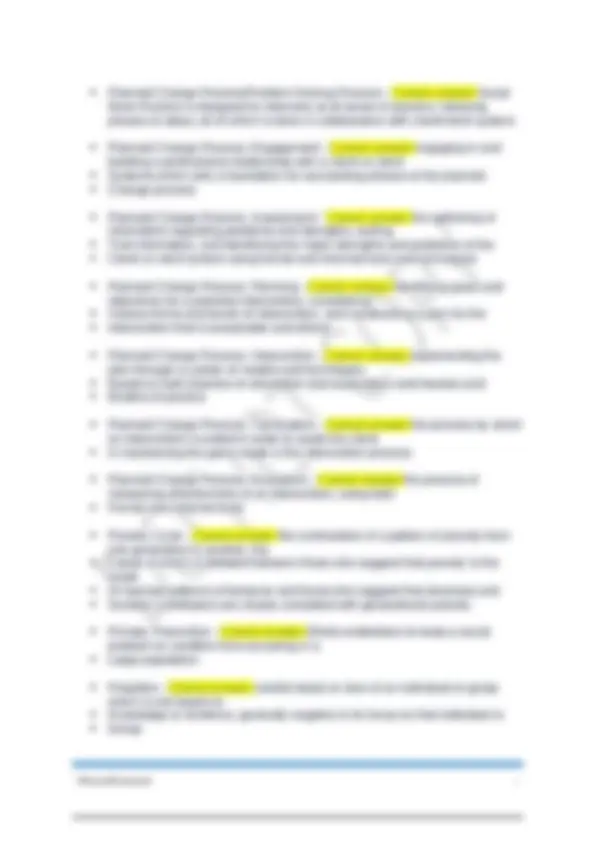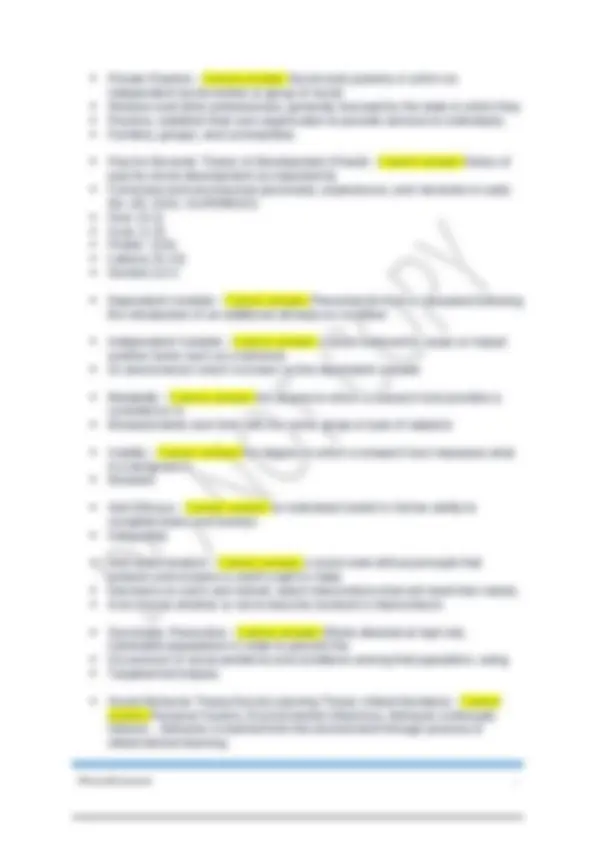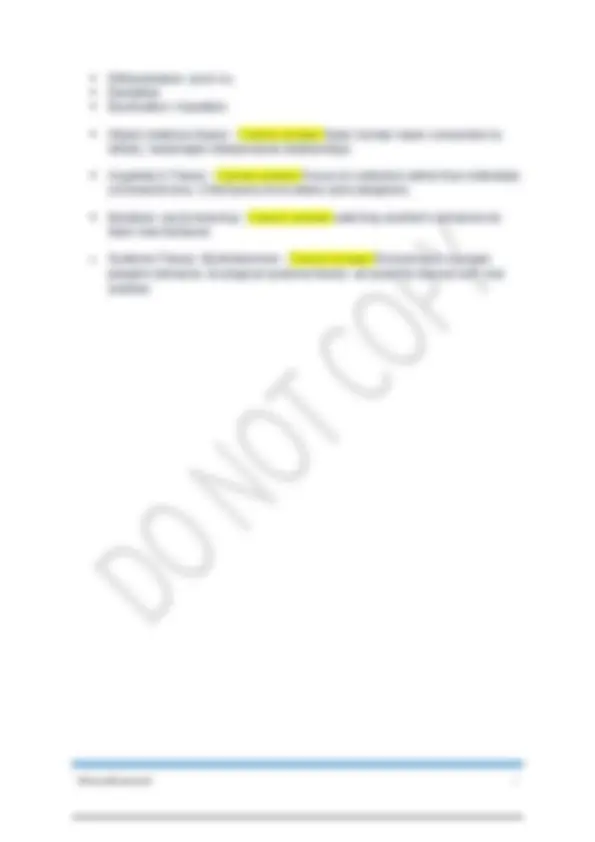






Study with the several resources on Docsity

Earn points by helping other students or get them with a premium plan


Prepare for your exams
Study with the several resources on Docsity

Earn points to download
Earn points by helping other students or get them with a premium plan
Community
Ask the community for help and clear up your study doubts
Discover the best universities in your country according to Docsity users
Free resources
Download our free guides on studying techniques, anxiety management strategies, and thesis advice from Docsity tutors
LSW (BSW) Licensing Exam Study Prep Exam Questions with 100% Correct Answers.LSW (BSW) Licensing Exam Study Prep Exam Questions with 100% Correct Answers.LSW (BSW) Licensing Exam Study Prep Exam Questions with 100% Correct Answers.
Typology: Exams
1 / 8

This page cannot be seen from the preview
Don't miss anything!





Advocacy - Correct answer representing others individually or in groups in order to protect them or advance their cause Assessment - Correct answer the process of examining a problem to determine its cause, severity, and course which is necessary to design an effective intervention plan. (All levels of practice) Attachment disorder - Correct answer Inability to form emotional bonds with caretakers often due to negative early childhood experiences Behavioral Model - Correct answer Based on learning theory which focuses on process of shaping and changing behavior through use of rewards and reinforcement Behavioral theory - Correct answer Human behavior and development are seen as responses to stimuli and consequences, both negative and positive Beneficence - Correct answer Desire to act for the benefit and welfare of others Broker - Correct answer Role of social worker: clients are linked with organization in order to receive services Bio-psycho-social theory - Correct answer Holistic theory of human development that attempts to explain how bio/psycho/social development are interactive in terms of influencing development Case management - Correct answer Role of social worker: securing, implementing, and monitoring services needed by client. Oversee/Coordinate client’s services to keep with clients goals and needs. Change agent - Correct answer Social worker working toward change at micro/mezzo/macro level Child welfare - Correct answer Monitoring and promoting rights and welfare of children and youth Civil rights - Correct answer Rights of citizens given by a government that protect them from abuse by individuals, organizations, policies or governments Classism - Correct answer Stereotyping based on socioeconomic status Client system - Correct answer the client and clients social environment which impact client and which are the target of social work intervention
Cognitive Behavioral Model - Correct answer Theory/Model based on behaviorism and social learning theory that helps clients recognize the impact of self-defeating or erroneous cognitive beliefs or perceptions on their behavior Crisis Intervention Model - Correct answer The practice theory/model that focuses on helping clients deal with overwhelming crisis situations by drawing upon their strengths and resources to get them through the crisis and return to a normal level of functioning Defense Mechanism - Correct answer denial, rationalization, projection, minimization, intellectualization Desensitization - Correct answer exposing an individual to stimuli or experiences that cause anxiety, with the idea that exposure will lessen anxiety and fear Developmental Theory - Correct answer Micro, Mezzo, Macro level of practice that suggests that individuals, families, groups, communities, societies proceed through somewhat predictable stages in their ongoing development Ecosystems/Ecological Perspective - Correct answer Professional view of clients/client systems in which the interaction between the client and social environment is examined External Locus of Control - Correct answer Belief that one's situation is controlled by external forces and that one's personal ability or power to change a condition is limited or non-existent Family Systems Theory - Correct answer Developmental Theory that focuses on the mutual interactions between parts of the family and which forms the basis for family systems interventions Gender Role - Correct answer societal expectations for behavior and social roles based on gender Harm Reduction Model - Correct answer Practice Theory/Model in social work and public health whose goal is to decrease harm and consequences of a behavior pattern instead of to cure or eradicate the problem Hawthorne Effect - Correct answer the tendency of people to behave differently when they know they are being observed Institutional Racism - Correct answer Discrimination and unequal treatment in institutions and organizations through policies, practices, and exclusion. Activities of Daily Living (ADL) vs. Instrumental Activities of Daily Living (aid) - Correct answer Basic Activities of Self Care vs. Higher Functioning Tasks of Self Care
Planned Change Process/Problem Solving Process - Correct answer Social Work Practice is designed to intervene at all levels of practice, following phases or steps, all of which is done in collaboration with client/client system. Planned Change Process- Engagement - Correct answer engaging in and building a professional relationship with a client or client Systems which sets a foundation for succeeding phases of the planned Change process Planned Change Process: Assessment - Correct answer the gathering of information regarding problems and strengths, sorting That information, and identifying the major strengths and problems of the Client or client system using formal and informal tools and techniques Planned Change Process: Planning - Correct answer Identifying goals and objectives for a potential intervention, considering Various forms and levels of intervention, and constructing a plan for the Intervention that is reasonable and ethical Planned Change Process- Intervention - Correct answer implementing the plan through a variety of models and techniques, Based on both theories of orientation and explanation and theories and Models of practice Planned Change Process- Termination - Correct answer the process by which an intervention is ended in order to assist the client In maintaining the gains made in the intervention process Planned Change Process- Evaluation - Correct answer the process of measuring effectiveness of an intervention, using both Formal and informal tools Poverty Cycle - Correct answer the continuation of a pattern of poverty from one generation to another, the Cause of which is debated between those who suggest that poverty is the result Of learned patterns of behavior and those who suggest that structural and Societal contributors are closely correlated with generational poverty. Primary Prevention - Correct answer Efforts undertaken to keep a social problem or condition from occurring in a Large population. Prejudice - Correct answer a belief about or view of an individual or group which is not based on Knowledge or evidence, generally negative in its focus on that individual or Group
Private Practice - Correct answer Social work practice in which an independent social worker or group of social Workers and other professionals, generally licensed by the state in which they Practice, establish their own organization to provide services to individuals, Families, groups, and communities. Psycho Dynamic Theory of Development (Freud) - Correct answer theory of psycho-social development as impacted by Conscious and unconscious processes, experiences, and memories in early life. (ID, EGO, SUPEREGO) Oral- (0-1) Anal- (1-3) Phallic- (3-6) Latency (6-12) Genital (12+) Dependent Variable - Correct answer Phenomenon that is measured following the introduction of an additional stimulus or condition Independent Variable - Correct answer a factor believed to cause or impact another factor such as a behavior Or phenomenon which is known as the dependent variable Reliability - Correct answer the degree to which a research tool provides a consistency in Measurements over time with the same group or type of subjects Validity - Correct answer the degree to which a research tool measures what it is designed to Measure Self-Efficacy - Correct answer an individual's belief in his/her ability to complete tasks and function Adequately Self-Determination - Correct answer a social work ethical principle that protects and ensures a client's right to make Decisions on one's own behalf, select interventions that will meet their needs, And choose whether or not to become involved in interventions Secondary Prevention - Correct answer Efforts directed at high risk, vulnerable populations in order to prevent the Occurrence of social problems and conditions among that population, using Targeted techniques. Social Behavior Theory/Social Learning Theory (Albert Bandura) - Correct answer Personal Factors, Environmental Influences, Behavior continually interact... Behavior is learned from the environment through process of observational learning.
Erikson Theory of Psychosocial Development - Correct answer Psychosocial Crisis Trust vs. Mistrust (0-1.5) Autonomy vs. Shame (1.5-3) Initiative vs. Guilt (3-5) Industry vs. Inferiority (5-12) Identity vs. Role Confusion (12-18) Intimacy vs. Isolation (18-40) Generativist vs. Stagnation (40-65) Integrity vs. Despair (65+) Humanistic Theory of Human Functioning - Correct answer as individuals and families search for meaning and make life Choices, they have strengths to utilize and freedom of action Behavioral model - Correct answer the practice theory / model which focuses on the process of Shaping and changing behavior through the use of operant And classical conditioning including rewards and Reinforcement. Cognitive behavioral model - Correct answer the practice theory / model based on learning theory which Focuses on the process of shaping and changing behavior Through the use of rewards and reinforcement Crisis intervention model - Correct answer the practice theory / model which focuses on helping clients Deal with overwhelming crisis situations by drawing upon their Strengths and resources to get them through the crisis and Return to a normal level of functioning, and in which a Professional may take a more directive role because of the Client’s inability to proceed Defense Mechanism - Correct answer Repression Denial Projection Rationalization Displacement Intellectualization Regression Sublimation Behavioral Model - Correct answer Conditioning Classical conditioning- Pavlov Operant Conditioning- Skinner Neuron development - Correct answer Proliferation- production Migration- movement
Differentiation- axon vs. Dendrites Myelination- insulation Object relations theory - Correct answer Basic human need- connection to others, meaningful interpersonal relationships Vygotsky's Theory - Correct answer Focus on collective rather than individual, communist lens. Child learns from others and caregivers. Bandura- social learning - Correct answer watching another's behaviors to learn new behavior. Systems Theory- Brofenbrenner - Correct answer Environment changes people's behavior. Ecological systems theory- all systems interact with one another.